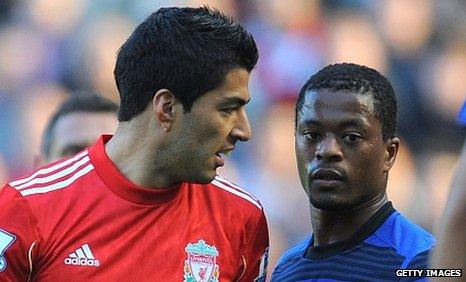No Luis Suarez appeal from Liverpool over racism ban
- Published

Liverpool say the Football Association panel has damaged Suarez's reputation
Liverpool will not appeal against Luis Suarez's eight-match ban for racially abusing Manchester United defender Patrice Evra.
However, in a strongly worded statement, the club maintained Suarez was innocent of the charge.
But the Reds said they fully supported moves "to stamp out racism in every form, inside and outside the sport".
"It is for this reason that we will not appeal the eight-game suspension of Luis Suarez," the club added.
Suarez also released a statement in which he said he would "carry out the suspension with the resignation of someone who hasn't done anything wrong".
The ban started immediately, meaning Suarez missed Tuesday's 3-0 defeat at Manchester City.
A 115-page independent report into the incident with Evra during the , external, found the Uruguay striker gave "unreliable" evidence to the body that was investigating the case.
It said Suarez had "damaged the image of English football around the world". Suarez was said to have used the term "negro" seven times in around two minutes.
But Liverpool, in their statement, said their "strongly held conviction" was that the Football Association and the panel it selected constructed a highly subjective case...based on an accusation that was ultimately unsubstantiated".
"The FA panel has damaged the reputation of one the Premier League's best players, deciding he should be punished and banned for perhaps a quarter of a season," it continued.
"This case has also provided a template in which a club's rival can bring about a significant ban for a top player without anything beyond an accusation."
However, Liverpool went on to say there were "ultimately larger issues than whether or not Luis Suarez has been treated fairly".
"English football has led the world in welcoming all nationalities and creeds into its Premier League and its leagues below, and Liverpool Football Club itself has been a leader in taking a progressive stance on issues of race and inclusion," Liverpool said.
"The Luis Suarez case has to end so that the Premier League, the Football Association and the club can continue the progress that has been made and will continue to be made and not risk a perception, at least by some, that would diminish our commitment on these issues.
"Liverpool Football Club have supported Luis Suarez because we fundamentally do not believe that Luis on that day - or frankly any other - did or would engage in a racist act.
"Continuing a fight for justice in this particular case beyond today would only obscure the fact that the club wholeheartedly supports the efforts of the Football Association, the Football League and the Premier League to put an end to any form of racism in English football.
"It is time to put the Luis Suarez matter to rest and for all of us, going forward, to work together to stamp out racism in every form both inside and outside the sport.
"It is for this reason that we will not appeal the eight-game suspension of Luis Suarez."
Meanwhile, Suarez said he had "never had a racial problem with a team-mate or individual who was of a different race or colour to mine".
"I'm very upset at feeling so powerless whilst being accused of something which I did not, nor would not, ever do," he said.
"In my country, 'negro' is a word we use commonly, a word which doesn't show any lack of respect and is even less so a form of racist abuse. Based on this, everything which has been said so far is totally false.
"I will carry out the suspension with the resignation of someone who hasn't done anything wrong and who feels extremely upset by the events.
"I do feel sorry for the fans and for my team mates whom I will not be able to help during the next month. It will be a very difficult time for me."
Professional Footballers' Association chief executive Gordon Taylor welcomed Liverpool's decision not to appeal.
"We think this shows good judgement and is to their credit," he said.
"We hope they can now move on and ensure that all their employees understand the issues involved and we look forward to them playing an important role in our campaign against discrimination."
- Published3 January 2012
- Published31 December 2011
- Published20 December 2011
- Published17 November 2011
- Published28 October 2011
- Published17 October 2011
- Published16 October 2011
- Published16 October 2011